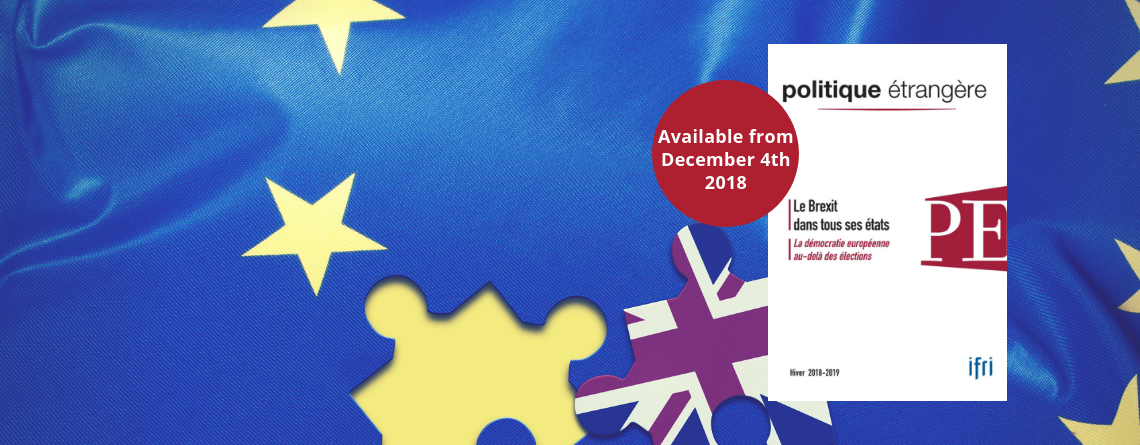Brexit: Getting in a State
As Brexit fast approaches, what can be said about the key issues? Politique étrangère summarizes them with four questions.

Will a lone United Kingdom have the means to redefine its relations with the rest of the world on its own terms? How can the Irish border issue be solved—should the border be restored for the sake of EU relations, or should it remain invisible to keep the peace? What will the true economic consequences of the break-off from Europe be, for both sides? And finally, will the United Kingdom remain a major player when it comes to security and defense, once London has been excluded from the European decision-making circle?
The upcoming European Parliament elections in May 2019 also invite us to revisit the notion of the famous European “democratic deficit.” The Counter Analysis section of this issue looks at two contrasting approaches. One of them has faith in the processes at work within the EU, which are establishing increasingly democratic balancing and monitoring practices between the different institutions. The other claims that the political exchanges and principles underlying democracy can only be taken on by individual populations, in other words, only on a national level: The EU is only democratic thanks to the voluntary cooperation of the entities that make it up. This is a crucial debate for an EU whose opinions are causing it to lose credibility.
Politique étrangère then moves away from Europe to focus on the Rohingya crisis, the unknown future of a post-election Afghanistan, the chaos in Libya, and the unexpected rapprochement between Ethiopia and Eritrea. It also examines the role of artificial intelligence (AI) in military strategy: Does AI decrease the effectiveness of human strategies, and will it ultimately threaten to replace them?
CASE FILE
BREXIT: GETTING IN A STATE
The United Kingdom and the World After Brexit, by Pauline Schnapper
The Economic and Financial Impact of Brexit, by Emmanuel Mourlon-Druol
The Irish Question, a Major Brexit Issue, by Marie-Claire Considère-Charon
Brexit and European Defense: Toward an Ambiguous Deal?, by Jolyon Howorth
COUNTER ANALYSIS
EUROPEAN DEMOCRACY AFTER THE ELECTIONS
Can There be a European Democracy?, by Marie-Françoise Bechtel
The Challenge of European Democracy, by Maxime Lefebvre
CURRENT AFFAIRS
Trump’s Trade Wars: The Outcry Against Multilateralism, by Jean-Marc Siroën (read the article in French)
What Next for Afghanistan?, by Jean-Luc Racine (read the article in French)
BAROMETERS
Rohingya: Can the Crisis be Resolved?, by Sophie Boisseau du Rocher
Libya since 2015: Between Division and Interference, by Jalel Harchaoui
Blitzkrieg for Peace: Ethiopian-Eritrean Reconciliation, by Alain Gascon
Will Artificial Intelligence Revolutionize the Art of War?, by Jean-Christophe Noël
REFLECTIONS
Jihadism: A Battle Won but the War Continues, by Asiem El Difraoui
BOOK REVIEWS
Les boîtes à idées de Marianne. État, expertise et relations internationales en France, by Sabine Jansen
by François Chaubet
What Is Russia Up to in the Middle East?, by Dmitri Trenin
Russia’s Middle East Policy: From Lenin to Putin, by Alexeï Vassiliev
by Julien Nocetti
This content is available in French: "Le bulletin d'abonnement à Politique étrangère, vol. 83, n° 4, 2018"
This content is available in French: "Le dossier de presse de Politique étrangère, vol. 83, n° 4, 2018"
This content is available in French: "Éditorial de Politique étrangère, vol. 83, n° 4, 2018"
This content is available in French: "Les lectures de Politique étrangère, vol. 83, n° 4, hiver 2018-2019"
Download the full analysis
This page contains only a summary of our work. If you would like to have access to all the information from our research on the subject, you can download the full version in PDF format.
Brexit: Getting in a State





